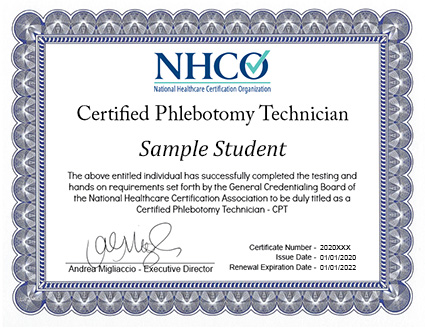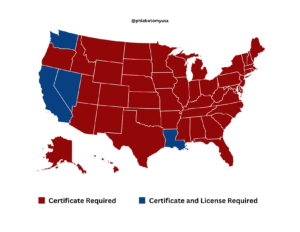07 Aug How to Renew Your Phlebotomy Certification

As a phlebotomist, you’re skilled in taking blood samples, which is very important in healthcare. It’s essential to keep renewing your certification and license to ensure everyone’s safety and to stay professional. All in all, this article will discuss why renewing is important, what’s needed, and how it helps improve your skills.
The Importance of Renewal
Phlebotomy is a skill where you need to be very careful and precise. It’s important to renew your certificates to stay updated with the newest methods and safety rules. Generally, you need to perform this renewal once every two years. By renewing, you show others that you’re skilled and trustworthy in your job.
The renewal process not only makes sure that your knowledge and skills remain current but also helps you stay informed about any changes in regulations or best practices within the field.
Renewing Your Phlebotomy Certification
Most agencies ask you to take some educational courses (CEUs) within a set time to keep your phlebotomy certification. CEUs can be workshops, online courses, or seminars about phlebotomy and related topics. These classes help update your knowledge and introduce you to new methods and studies.
Continuing education is vital because it allows you to learn about advancements in technology, updated safety protocols, and innovative techniques that can enhance your practice.
How to Renew Your Phlebotomy Certification
Visit the website of the agency that issued your certificate, not your training program. This is likely the organization you tested with, like NHA or NHCO. Stay in touch with them to get the latest renewal guidelines.
Follow the renewal steps on the website. Each agency may have different rules, so check their guidelines. Usually, you’ll need to provide proof of completed continuing education units (CEUs), update your personal info, and pay a renewal fee. The online system will guide you through the process.
Note: Different places may have different rules for renewal, so always check their guidelines.
Renewing Your Phlebotomy License
Along with certification, phlebotomists in California, Louisiana, Washington, and Nevada also need a license to work. You will usually update your details, pay a fee, and do some educational activities to renew this license. What’s more, certification renewal may not be required if you renew your license. The organization that gave you the license will guide you on how to renew it on their website. Maintaining your license is as important as your certification because it guarantees your legal eligibility to practice in your state.
Where to renew your license by state:
- California: California Department of Public Health
- Louisiana: Louisiana State Board of Medical Examiners
- Nevada: Nevada Division of Public and Behavioral Health
- Washington: Washington State Department of Health
Don’t forget when your license expires! Knowing the date helps you renew on time and avoid work interruptions. Keeping track of your renewal dates is essential, as failing to renew on time can lead to lapses in your ability to work legally as a phlebotomist. Setting reminders and planning ahead can help you stay on top of this responsibility.
Benefits of Renewal
Renewing your certification and license isn’t just a regulatory requirement—it offers several significant benefits that can enhance your career and the quality of care you provide. By staying current with your credentials, you demonstrate a commitment to excellence in your field.
Better Skills
When you renew your certificate and license, you keep improving your skills. You’ll also stay updated with new methods and tools in the field. This continuous improvement makes sure that you can provide the best possible care to your patients and adapt to any changes or advancements in phlebotomy practices.
More Jobs
Employers like phlebotomists who keep learning. So, renewing can help you get better job opportunities. Certification and license make you a more competitive candidate in the job market, as they signal to employers that you are dedicated to your professional development and committed to maintaining high standards of care.
Patients Trust You More
A valid certificate and license make patients feel they’re in safe hands. Patients are more likely to trust healthcare professionals who stay current with their certifications and licenses, as it reassures them that they are receiving care from someone who is knowledgeable and up-to-date in their field.
Avoid Legal Trouble
Working with an outdated license or certificate can cause legal problems. Therefore, renewing helps you follow the law and protect your job. Staying compliant with state and national regulations is critical to avoiding potential legal issues that could arise from practicing without valid credentials.
Making Certification/License Renewal Easy
To guarantee a smooth renewal process, follow these steps:
- Remember Dates: Note down when your certificate or license expires so you can renew on time.
- Take Classes: Join workshops, seminars, or online courses to get the needed CEUs during your certificate time.
- Check the Rules: Make sure you know what the renewal agencies ask for so you’re ready.
- Start Early: Plan your renewal before the due date to avoid rushing.
Renewing your phlebotomy certification and license is both a job requirement and a chance to grow. By keeping updated, you give the best care to patients. Think of renewal as a way to improve your skills, show you’re dedicated to being the best, and help patients even more. We’re here to support you every step of the way at Phlebotomy Training Specialists, whether you’re renewing your credentials or seeking to advance your career. For more information on phlebotomy training and certification, visit our blog or check out our locations to find a program near you.

